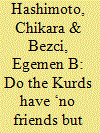| Srl | Item |
| 1 |
ID:
116173


|
|
|
|
|
| Publication |
2012.
|
| Summary/Abstract |
Using newly released and previously unexploited records, this article explores the existence of Anglo-Arab secret liaison and cooperation in instituting anti-communist measures in the early Cold War. It shows that owing to their concern about a war against the Soviet Union, the placing of a British security/police adviser in specific countries was the preferred method by Britain for checking and combatting communism in the Middle East. It argues that the development of the 'anti-communist triangle' (the security liaison between Lebanon, Iraq and Jordan) was largely influenced by British concern about the expansion of communist influence. Moreover, the expansion of British influence in the region also converged with the demands from Middle Eastern countries for a British expert in anti-communist measures. The article implies the importance of the role of secret liaison in historical enquiries.
|
|
|
|
|
|
|
|
|
|
|
|
|
|
|
|
| 2 |
ID:
146799


|
|
|
|
|
| Summary/Abstract |
A Kurdish proverb says that the Kurds have ‘no friends but the mountains’. This was not what the Turkish authorities believed. Using new and previously unexploited archives both in English and Turkish, this article offers a new interpretation of Turkey's perception of the Kurds. By analyzing Kurdish activities and their alignment with Communist movements and Soviet activities, it shows how Turkey's threat perception was shaped by international contexts, especially through the Cold War. In addition, the Kurdish nationalist movement in the Middle East played a pivotal role in regional intelligence cooperation between Turkey, Iraq and Iran. This article argues that Soviet and Communist activities had an important role in shaping Turkey's threat perception of the Kurdish minority in the country. Turkey's perception of subversive threats involved an intertwining of Communists, Soviets and Kurds. This affected the Kurdish bid for independence for most of the twentieth century.
|
|
|
|
|
|
|
|
|
|
|
|
|
|
|
|